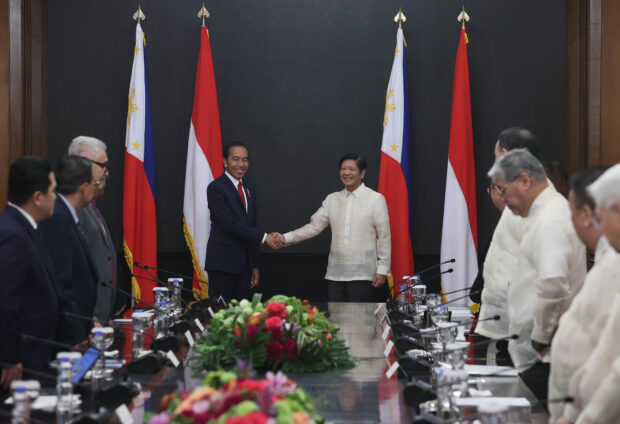Marcos, Widodo tackle border patrols, anti-submarine warfare

MUTUAL INTERESTS | Visiting Indonesian President Joko Widodo and President Ferdinand Marcos Jr. open their bilateral meeting in Malacañang on Wednesday, Jan. 10, 2024. Security, defense cooperation, and trade were on the agenda, plus the long-standing plea from Manila for Jakarta to finally free convicted drug courier Mary Jane Veloso. (Photo by MARIANNE BERMUDEZ / Philippine Daily Inquirer)
MANILA, Philippines — President Ferdinand Marcos Jr. said he and Indonesian President Joko Widodo had a “fruitful and honest discussion” on issues confronting the Asia-Pacific region, including maritime tensions in the South China Sea.
The Palace media office provided little specifics about what was discussed, but among the topics covered concerning security was the proposal for the Philippines to acquire antisubmarine aircraft from its Southeast Asian neighbor.
The two leaders sat down for a bilateral meeting in Malacañang on Wednesday to discuss “regional events of mutual interest, such as the developments in the South China Sea and Asean cooperation and initiative,” Marcos said, referring to the 10-member Association of Southeast Asian Nations (Asean), of which Jakarta and Manila are founding members.
“As neighbors, we must remain united in addressing the many challenges that our region now faces,” he said.
Marcos said he and Widodo both “affirmed our insistence on the universality of Unclos (United Nations Convention on the Law of the Sea), which [lays] out the legal framework that governs all activities in the oceans and the seas.”
Article continues after this advertisementWidodo added in a joint press conference after the meeting that the two countries had agreed to strengthen defense cooperation and existing agreements on border cooperation.
Article continues after this advertisement“We agreed to … expedite revision of joint border patrol and crossing agreements, also to strengthen the defense cooperation, including on military hardware,” he said.
On Tuesday, Indonesia’s Foreign Minister Retno Marsudi said her country was ready to work with other Southeast Asian nations to finalize a long-delayed code of conduct for the South China Sea, where many of its neighbors have overlapping claims with China.
Slow progress
“On the South China Sea, Indonesia is ready to work together with all Asean member states, including the Philippines, to finalize the Code of Conduct as soon as possible,” Retno told a joint press conference with Filipino counterpart Enrique Manalo in Manila, ahead of Widodo’s visit.
The Asean bloc and China have for years been trying to create a framework to negotiate a code of conduct, a plan dating as far back as 2002. But progress has been slow despite commitments by all parties to advance and expedite the process.
China stakes its claim on its maps with the use of a “nine-dash line” that loops as far as 1,500 kilometers south of its mainland, cutting into the exclusive economic zones (EEZ) of Brunei, Indonesia, Malaysia, the Philippines, and Vietnam.
Antisubmarine
A 2016 international arbitral tribunal ruling invalidated most of China’s claims and upheld the Philippines’ sovereign rights to fish and explore resources within its EEZ, a decision that Beijing has rejected.
During the bilateral meeting, Widodo also sought Marcos’ support for a proposal to have the Philippines procure antisubmarine aircraft from his country.
“I also seek Your Excellency’s support related to the purchase of antisubmarine warfare aircraft for the Philippine Navy from Indonesia,” Widodo told Marcos without providing details.
At present, the Philippines has two anti-submarine warfare units purchased by the Armed Forces of the Philippines from the United Kingdom.
In June last year, the Philippine Navy deployed for the first time the missile-armed BRP Antonio Luna (FF-151) and AgustaWestland AW159 Wildcat helicopter to Palawan, a province facing the West Philippine Sea, or the waters within the country’s EEZ.
Trade cooperation
As for economic cooperation between Jakarta and Manila, Widodo assured Mr. Marcos that Indonesia remained “committed to keep market access open for Philippines’ agriculture commodities.”
Marcos and Widodo also witnessed the signing of a memorandum of understanding (MOU) to strengthen energy cooperation between the two countries.
According to the Department of Energy (DOE), the MOU would facilitate cooperation between the Philippines and Indonesia, particularly on supply constraints on energy commodities, such as coal and liquefied natural gas.
The DOE said the MOU would also push collaboration on energy transition, renewable energy, demand-side management, electric vehicles, and alternative fuels, such as hydrogen, ammonia, and biofuels.
—WITH A REPORT FROM REUTERS
For comprehensive coverage, in-depth analysis, visit our special page for West Philippine Sea updates. Stay informed with articles, videos, and expert opinions.